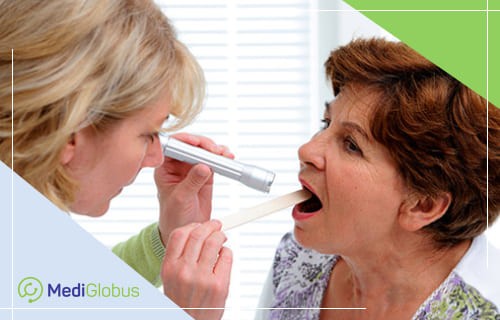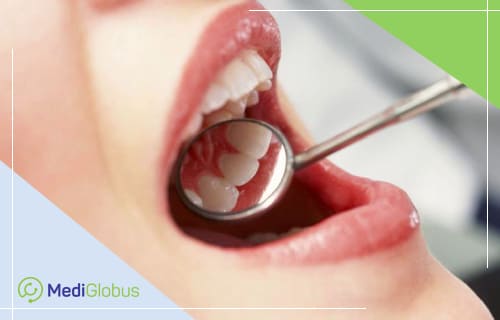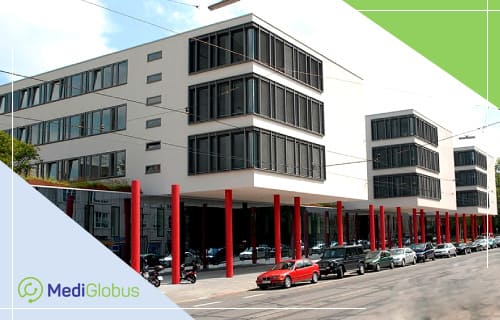Oral tumours are the 11th most common type of cancer in the world. While the incidence of other cancers is declining globally, with tongue cancers it is only increasing, especially among young people. You can learn about how tongue cancer is diagnosed and treated in foreign clinics in this article.
What is tongue cancer?

Tongue cancer is a malignant malignancy of the oral cavity. It usually appears as a tumour or ulcer in the front of the tongue.
The most common form of this cancer is squamous cell carcinoma. It got its name from the type of cells from which the pathological process takes place. Squamous cell carcinoma grows from a thin flat epithelium that covers the inner cavity of the mouth, throat, thyroid and pharynx.
Tongue cancer is twice as common in men as in women. Older people are more susceptible to it. About 25% of cases occur before the age of 55. Tongue cancer is almost non-existent in children.
Factors that increase the risk of tongue cancer are:
tobacco use;
alcohol abuse;
diet low in fruits and vegetables;
human papillomavirus.
People who smoke and consume alcohol have a 15-fold increase in the risk of tongue cancer.
Symptoms of tongue cancer
Early symptoms of tongue tumour are similar to those of other oral cancers. Sometimes they can be hard to notice, making people postpone the visit to the doctor. These symptoms may also indicate other diseases:
white or red spots on the tongue surface;
mouth ulcers that don’t heal;
sore throat, pain during swallowing;
feeling of a lump in a throat;
pain in the tongue, neck and ears;
voice hoarseness;
issues with moving tongue and jaw;
loose teeth;
swelling in the mouth that lasts more than 3 weeks;
if the dentures no longer fit.
Doctors recommend that people who are at risk should be examined by a dentist every year.
Stages of Tongue Cancer
Tongue cancer is classified according to how far it has spread. Doctors use three letters to note the stage:
T indicates the size of primary formation. T1 is the smallest tumour, T4 is the largest.
N indicates if cancer has spread to the lymph nodes. At N0 they are not affected, and at N3 cancer cells are detected in remote lymph nodes.
M indicates the presence of metastases.
Doctors also divide tongue cancer into a low, medium and high grade. The higher the grade, the more aggressive the cancer is and the faster it spreads throughout the body.

Tongue Cancer Diagnostics
To diagnose tongue cancer, the doctor examines the oral cavity. They pay attention to ulcers or lumps that do not disappear for longer than three weeks. Also, the doctor checks if the lymph nodes have changed in size.

During the appointment, the doctor listens to the patient’s complaints, asks about their medical history, habits, and if they have any relatives with cancer.
If a pathological process is suspected, the doctor prescribes a diagnostic biopsy. It can be performed in two ways – an incisional and a brush biopsy.
In an incisional biopsy, the doctor uses a scalpel to extract a small sample of tissue from a suspicious neoplasm. The procedure is performed under local anaesthesia. The resulting sample is then examined in the laboratory for malignant cells. In most cases, this the preferred diagnostic method.
In the case of a brush biopsy, the doctor uses a special brush to cause slight bleeding of the tongue. The cells obtained in this way are also analyzed in the laboratory.
If the biopsy results confirm a cancerous process, the doctor may prescribe a head CT scan to determine how far the tumour has spread.
Methods of treatment of tongue cancer
Treatment of tongue cancer depends on the size and stage of the tumour. The oncologist determines which combination of methods will be most effective in each case.
If the size of the tongue tumour does not exceed 4 cm, it can be removed with a non-surgical procedure. In this case, laser or ultrasound treatment is used.
The main method of tongue cancer treatment is surgery. In the case of a single tumour at an early stage, a single procedure will suffice for complete recovery. However, if there are several tumours or they have spread, several interventions may be necessary.

In some cases, the doctor may decide to perform a glossectomy – complete or partial tongue removal. In foreign clinics, oncologists always try to minimize damage to the oral cavity. However, the patient’s life is always a top priority, and a glossectomy is a legitimate risk in this case.
Depending on the size and location of the tongue tumour, there are different methods of surgery:
Transoral | Conducted through the mouth. Used for small tumours in the front of the tongue. |
Transoral robotic-assisted surgery (TORS) | For the treatment of tumours of the base of the tongue. The doctor uses the da Vinci robot for the operation. |
Transoral laser microsurgery (TLM) | During this procedure, the doctor gets access to the base of the tongue using a special instrument – a laryngoscope. The tumour is then removed using a laser. |
Mandibulotomy | It is used to remove tumours of the base of the tongue and the back of the mouth cavity. For this procedure, the doctor makes an incision in the middle of the lower jawbone to access the posterior part of the tongue and mouth cavity. |
Transcervical pharyngotomy | In this case, the doctor accesses the lower part of the tongue through the incision in the neck. |
Lymph nodes affected by the cancer are also be removed.
In case the doctor removes only a part of the tongue, it is possible to perform reconstructive surgery. During the procedure, the surgeon transplants a small part of the patient’s tissue from another part of the body.
Late-stage tongue cancer is treated with a combination of methods. Besides surgery, radiotherapy and chemotherapy are also used. With these methods, it is possible to reduce the size of the tongue tumour and to destroy cancer cells that cannot be removed surgically.
Tongue cancer prognosis
The success of treatment depends on the stage at which the diagnosis was made. In the first stage of tongue carcinoma, the five-year survival rate is 78%. If cancer has begun to spread to lymph nodes, the number falls to 63%. With metastases, the survival rate is 36%.
Rehabilitation after tongue cancer

Complete or partial removal of the tongue inevitably has side effects. In particular, patients who have undergone this procedure have difficulty with:
speech;
eating;
swallowing;
breathing.
Patients who have lost over 50% of their tongue need a prosthesis. It makes it possible to partially compensate for the lost functions and makes the patient’s life much easier. The prosthesis is made individually for the shape of the mouth from hard or elastic materials.
Patients also undergo speech therapy to learn to talk and swallow food with the new prosthesis. The length of the course depends on how much of the ability has been lost.
Clinics that treat tongue cancer

Germany
The Rechts der Isar Clinic in Munich is considered one of the best oncology clinics in Germany. The hospital is certified by the German Cancer Society and the German Cancer Foundation. Every year more than 22,000 patients are treated at this hospital. The Department of Oral and Maxillofacial Surgery is headed by Professor Klaus Dietrich Wolff, President of the European Society of Oral and Maxillofacial Surgery. He specializes in the surgical removal of tumours and reconstructive surgery. In addition, there are other specialists with prestigious international awards in the field of medicine. This clinic successfully uses innovative technologies, including microvascular tissue transplantation. The equipment available at the clinic includes a variety of devices for laser surgery, CAD/CAM 3D printers for prosthetic fabrication, high-precision operating microscopes and digital volume tomography for 3D imaging.
University Hospital Münster (UKM) is a certificate holder of WHO, Unicef, DKG, DGAV, and KTQ. Doctors there successfully treat tongue cancer using both surgical methods and modern chemotherapy, radiation therapy and immunotherapy. The UKM Radiation Therapy Department, headed by Professor Hans Th. Eich, is among the best in the country, according to the FOCUS magazine. Since 2018, when the hospital opened its robotic surgery department, the clinic has become Germany’s leading centre for Da Vinci robotic surgery.
Israel
Ichilov Clinic is accredited by the most prestigious international medical organization JCI. Every year about 1.8 million outpatients and 400,000 inpatients from all over the world come to this hospital. The methods used by doctors to treat tongue tumours ensure maximum preservation of healthy tissue and fast rehabilitation. Tongue cancer is treated by Professor Dan Fleece, Head of the Otolaryngology Department, and Dr Moshe Yehuda, Head of the Head and Neck Surgery Department.
Chaim Sheba Medical Center is the leading university clinic in the country. The success rate of tongue cancer treatment at this centre is above 98%. In 67% of cases, the doctors can preserve the organ. Among the doctors who specialise in tongue carcinoma are renowned specialists such as Michael Wolf and Ran Yaalom.
Spain
Teknon Hospital in Barcelona is one of the top cancer centres in Spain. The doctors of the hospital perform over 14,000 operations per year. The Cancer Institute is headed by José Baselga, a graduate of Harvard University. The clinic has one of the highest tongue cancer treatment success rates in Spain, including robotic and reconstructive surgery methods.
Navarra University Hospital has been treating severe cancers for over 58 years. 95% of the patients treated there were happy with the result. Doctors successfully use da Vinci robot in operations, which increases the precision of the movements by a factor of 12. One of the doctors’ top priorities is organ preservation treatment.
Korea
Soon Chun Hyang Hospital is located in Seoul, the capital of South Korea. It is one of the most innovative medical institutions in the country. New methods of cancer treatment are constantly being developed on its basis. As a result, the hospital has many regional and international awards, including JCI and WEO.
Asan Clinic is one of the most respected clinics in Korea. From 2008 to 2011, it was the world’s top clinic in terms of patient satisfaction. Each year, the centre receives more than 200 patients with head and neck cancer – the highest rate in the world. Dr Kim Sang Yoon and Dr Nam Soon-Yul are some of the best specialists who treat tongue cancer.
Turkey
The network of Liv Clinics is located in Istanbul, the capital of Turkey. In 2016, it was awarded by the Center of Excellence for its achievements in the field of robotic surgery. Also, the Liv Clinic has international quality certificates from JCI and TÜV. Over 13,000 surgeries are performed there every year.
Memorial Network is one of the most successful medical facilities in the country. Every year more than 76,000 operations are performed here. The clinic’s departments are equipped with modern equipment, including the da Vinci robot, TrueBeam, Gamma-knife and Cyberknife. Also, the hospital employs many specialists with extensive experience in reconstructive facial surgery, who will help to rehabilitate after treatment in the most comfortable way possible. The clinic has been accredited by JCI four times and is a member of the US hospital community.
Prices of tongue cancer treatment
Germany
| Procedure | Cost |
|---|---|
| Tongue cancer removal | from €27,000 |
| Reconstructive surgery | from €33,000 |
| Chemotherapy | from €3,000 |
| Radiation therapy | from €7,500 |
Israel
| Procedure | Cost |
|---|---|
| Tongue cancer removal | from $30,000 |
| Reconstructive surgery | from $35,000 |
| Chemotherapy | from $3,500 |
| Radiation therapy | from $9,000 |
Spain
| Procedure | Cost |
|---|---|
| Tongue cancer removal | from €25,000 |
| Reconstructive surgery | from €32,000 |
| Chemotherapy | from €3,000 |
| Radiation therapy | from €7,500 |
Korea
| Procedure | Cost |
|---|---|
| Tongue cancer removal | from $23,000 |
| Reconstructive surgery | from $29,000 |
| Chemotherapy | from $2,000 |
| Radiation therapy | from $5,000 |
Turkey
| Procedure | Cost |
|---|---|
| Tongue cancer removal | from $18,000 |
| Reconstructive surgery | from $23,000 |
| Chemotherapy | from $2,000 |
| Radiation therapy | from $5,000 |
Resume
Tongue cancer is a rare but dangerous type of oral disease.
The main symptom of tongue cancer is an ulcer or tumour on the tongue surface.
The five-year survival rate for early-stage tongue carcinoma reaches 78%.
The main method of tongue cancer treatment is surgical removal. If the tumour is less than 4 cm in diameter, non-surgical removal is possible.
Leading specialists from Germany, Spain, Turkey, South Korea and Spain provide treatment for tongue cancer.
To learn more about the diagnosis and treatment of tongue cancer and to make an appointment at a foreign clinic, leave your application on the MediGlobus website. After that, our consulting physicians will contact you and help you with all your questions.





